A5 crossroads
Decision pending for NI’s deadliest road

“I was half conscious, I couldn’t move or talk, but I remember the policeman putting a sheet over my head and saying: ‘Leave him alone, he’s gone.'”
Jim Hunter from County Tyrone is one of thousands of people whose lives have been changed forever by road collisions on the A5.
The 58-mile stretch of tarmac, that traverses the west of Northern Ireland, has become one of the region's most infamous roads due to decades of tragic news headlines.
A plan for a new A5 dual carriageway was first proposed nearly 20 years ago.
It's been at the centre of a raging debate ever since, between those who say a new, modernised road is needed to save lives - and others who worry about the impact on farmland and the environment.
Legal challenges, as well as the mounting price tag have left the project in limbo. The current proposed cost for the build stands at £1.6bn.
But just how dangerous is the A5 compared to other roads?
According to the Department for Infrastructure (DfI), 57 people have died on the road since 2006.
But alongside the fatalities is a figure often overlooked.
Analysis by BBC News NI shows more than 1,200 people have been injured in accidents on the A5 in the last 10 years.
Many of those injured, like Mr Hunter, live with devastating consequences.
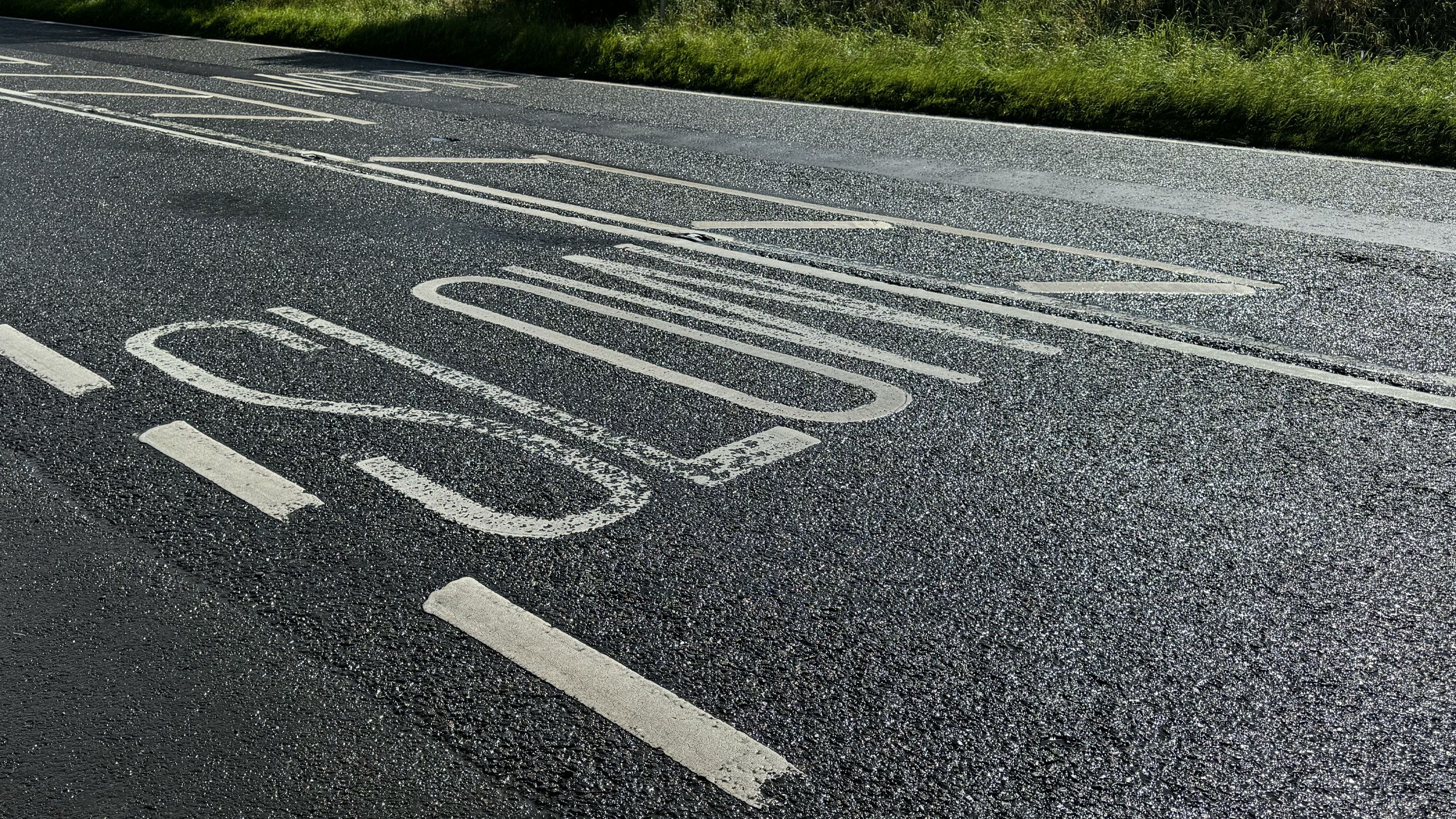
What is the A5?

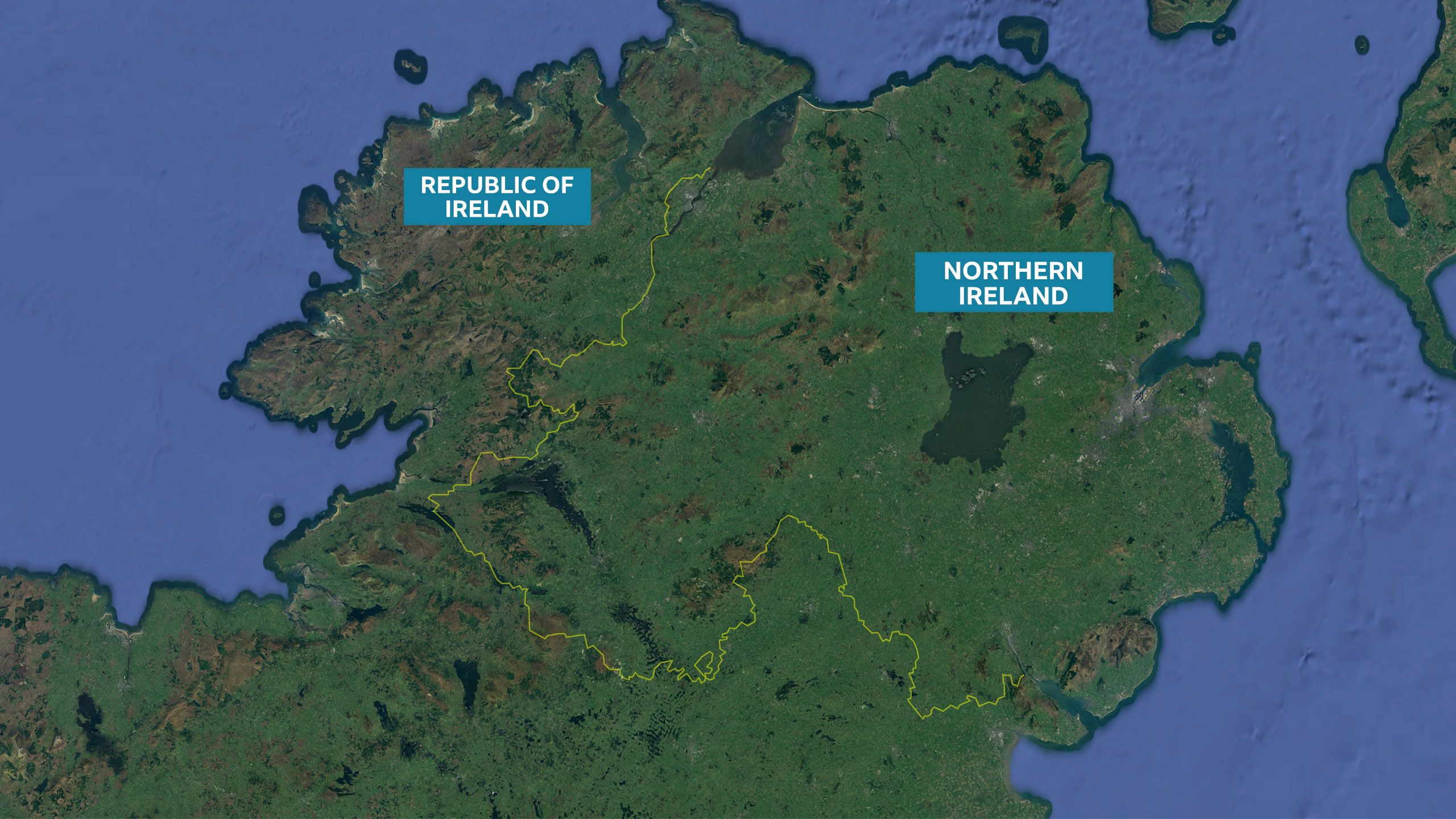

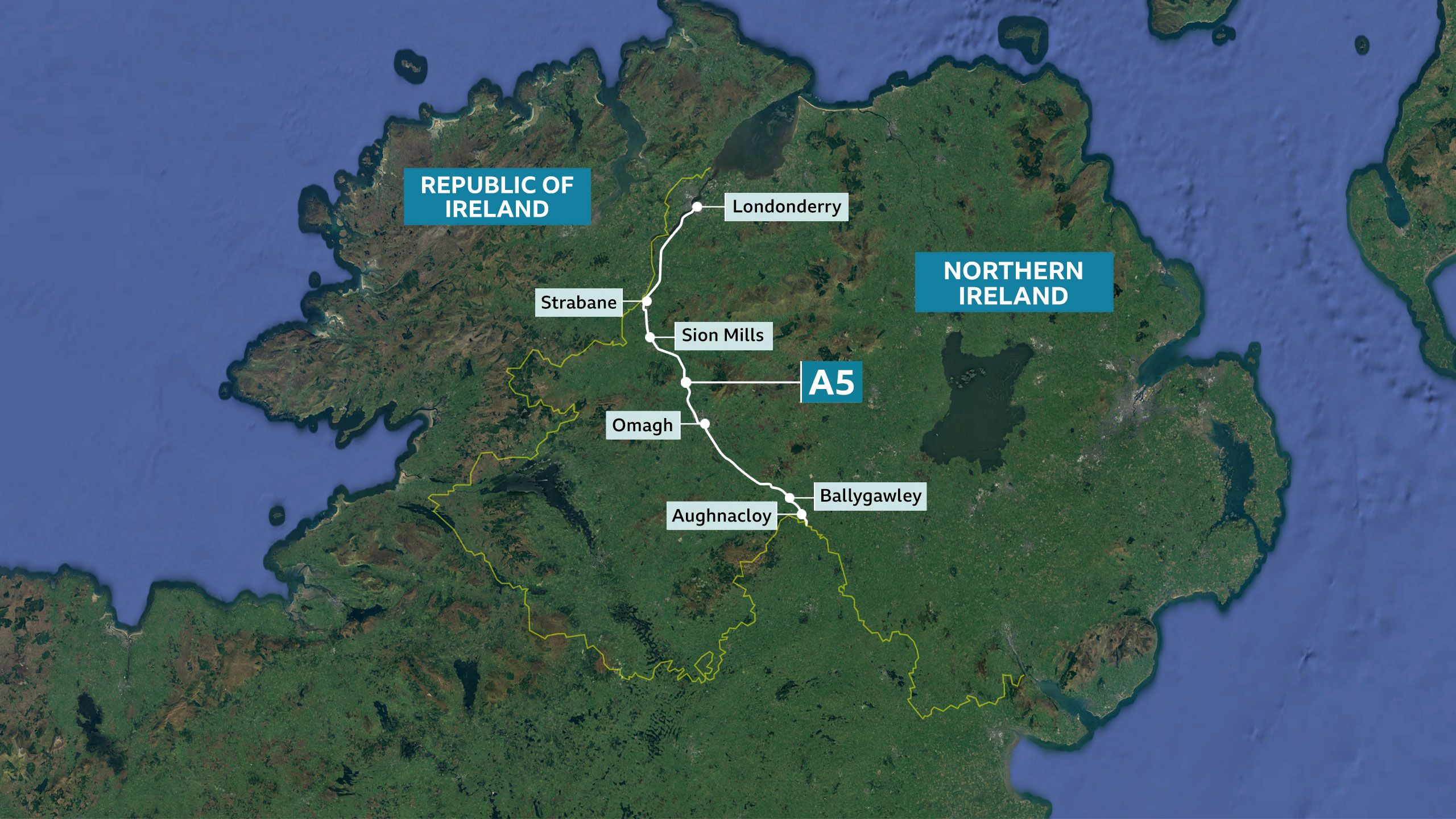
The A5 is a vital artery of the Northern Ireland road network. More than 58 miles (94km) long, it has more than 200 side roads connecting to it.
The road is single carriageway for most of its length, with overtaking lanes in some sections.
It links Londonderry with Aughnacloy in County Tyrone and passes through towns like Sion Mills, Omagh and Strabane.
It connects with the A4 road, linking to Belfast via the M1.
It is also the main north-south route in the west of Northern Ireland, providing a link between County Donegal and Dublin, via the N2 in County Monaghan.
The road has remained largely unchanged since the 1960s, with the exception of some town bypasses, but there has been a huge rise in the number of cars, lorries and agricultural vehicles using it since it was first built.
Official statistics show there has been about a 10% increase in traffic on the road in the last 10 years alone.
An increase of about 30% is forecast over the next 25 years.
Concerns
Some road safety campaigners have said the current A5 isn't fit for purpose and its out-dated design increases risk of mistakes and accidents.
Groups like Enough is Enough, who represent some bereaved families, say building a new dual carriageway is the safest option.
The sheer scale of human tragedy and loss means the debate around delays to the upgrade can sometimes fall into singular black and white arguments.
You’re either for or against it.
However, as is often the case with such stories, the reality is more complex.
Approximately 1,200 hectares of land, impacting more than 300 working farms will be required for the construction of a new 85km carriageway.
Opposition to it has been voiced most frequently by the campaign group, the Alternative A5 Alliance (AA5A).
While acknowledging the heartbreak connected to loss of life on the road, the group believes the existing A5 can be improved.
Its members have genuine concerns about losing land that has been in their families for generations.
They and others have pointed to the environmental impact of constructing such a large-scale project, as well as unresolved issues about building the new road near potential flood plains.
Meanwhile, figures released by police have shed new light on the cause of crashes on the A5, putting fresh focus on driver responsibility.
Delay
The position of Stormont’s Department for Infrastructure is that the existing road has been a barrier to economic growth and has seen increased safety risks due to more traffic and a lack of overtaking opportunities along the route.
In 2007 the Northern Ireland government announced plans to build a new dual carriageway under a project called the A5 Western Transport Corridor.

It was seen as a flagship project for the Northern Ireland Executive but has been delayed by funding issues and legal challenges brought by the Alternative A5 Alliance.
The Stormont minister who now has oversight of this issue is Sinn Féin’s John O’Dowd.
Speaking earlier this year, Mr O'Dowd said contractors had been appointed to ensure a readiness for construction subject to the completion of the PAC public inquiry process and a decision to proceed with the scheme.
In 2020 and 2023, a Planning Appeals Commission (PAC) public inquiry heard the arguments for and against the proposals.

Infrastructure Minister John O'Dowd
Infrastructure Minister John O'Dowd
Mr O'Dowd is in the process of considering the final recommendations of the public inquiry.
This is the crossroads at which the A5 project has been stuck at for some time – but with the minister’s decision expected within weeks, it’s clear the direction of travel will soon be decided.


Knock at the Door

“When you get that phone call to say you’ve lost a loved one, and that knock on the door comes from the police, it’s absolutely devastating,” said Angela O’Neill.

Angela O'Neill
Angela O'Neill
Her mother, County Tyrone pensioner Kathleen McGarvey, was hit by a car on the A5 in January 2018.
Ms McGarvey was crossing the road to go to mass at St Matthew’s Church in Garvaghy, when a car coming from the Ballygawley direction struck her.
She passed away from her injuries two weeks later on 27 January.

Kathleen McGarvey
Kathleen McGarvey
“My father was coming 80 years of age when he got that phone call and it was extremely traumatic for him and extremely traumatic for my brother to drive over the road knowing that their wife and mother was on the roadside.
“She was to come back, I think, with a fish supper for him for his tea,” Ms O’Neill said.
She remembers the last phone-call she had with her mother: “Again just typical of her nature, she was ringing me to see if I needed her to babysit the children and that was the last I heard from her.
“We never got to say goodbye.”
The stretch of A5 where Kathleen McGarvey was killed is considered particularly dangerous because, in addition to the high volume of fast traffic, there is also a network of minor roads that the local community use daily.
During the public inquiry, DfI officials argued that a reduction in traffic levels on the existing A5 would lead to an improvement in safety.
Officials said that modern dual carriageways with safer junctions had much lower accident rates and significantly reduced conflict with pedestrians.

Mother-of-seven Kathleen McGarvey had been a nurse, her husband a dairy farmer.
Their daughter grieves for the loss of the retirement they had hoped for after a life spent “working so hard and bringing us up”.
“What is happening on the A5 is not normal, there are too many scars and broken families along that road.
“It’s not fit for purpose, the new road needs started urgently.”
But how does the A5 compare to other roads in Northern Ireland?


'The most dangerous road in Northern Ireland'
The A2 is one of Northern Ireland’s longest roads, it includes the scenic Antrim coast road, but also follows the coastline counties of Down and Londonderry.

The A2 spans almost 250 miles
The A2 spans almost 250 miles
Between 2012 and 2024, the A2 road had the highest number of actual road deaths with 53 fatalities recorded.
But the A2 spans almost 250 miles (400km) – more than four times the length of the A5.

Wesley Johnston
Wesley Johnston
Wesley Johnston is a researcher with expertise on roads in the region.
He said road length should be taken into account when making fatality comparisons.
Using his own records and fact-checking against police figures, he has worked out the death rate per kilometre on the A5 in comparison with other major road networks in Northern Ireland.
His figures show that between 2012 and 2024, the A5 had the highest rate in Northern Ireland with 0.44 deaths per kilometre, which was followed by the A24 with 0.3 deaths per kilometre and then the A1 with 0.28 deaths per kilometre.
Looking specifically at sections of the A5, the Omagh to Ballygawley section had the highest number of fatalities with 17 between 2012 and 2024.
In the Republic of Ireland, the N2 had the highest death rate with 0.56 fatalities per kilometre – the road that joins the existing A5 at the border with the Republic of Ireland.
Wesley Johnston said the data shows that with the death rates on the A5 and connecting N2, the main route from County Donegal to Dublin is one of the deadliest on the island of Ireland.
He added: “I think when you look at the figures, it is safe to say the A5 is statistically the most dangerous road in Northern Ireland.”

Lucky to be alive
Figures obtained by BBC News NI also shed new light on the extent of injuries on the A5 over the years.
Police statistics show that between 2013 and 2023 there were 739 road traffic collisions resulting in 1,237 people left injured.
Jim Hunter's front door leads directly onto the A5 as it passes through Sion Mills.
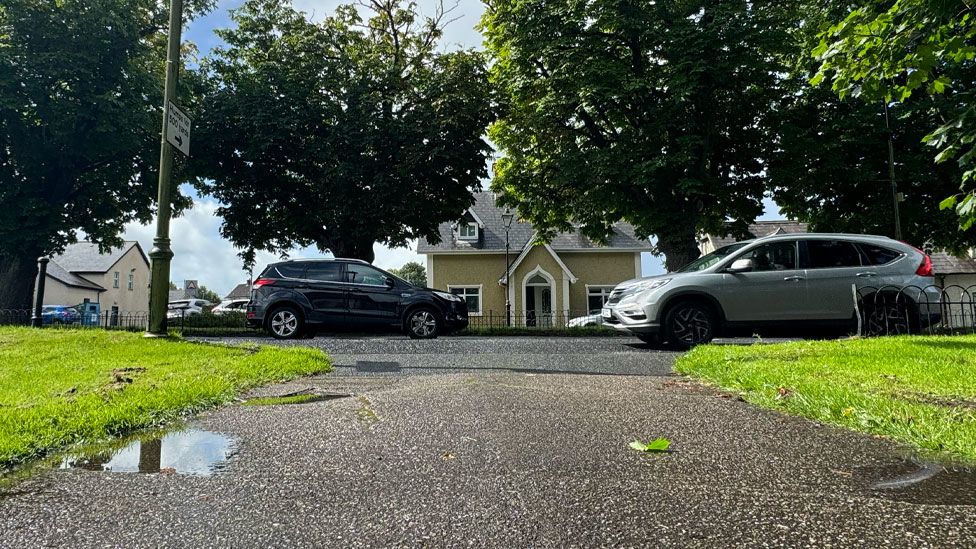
The driveway leads to the main A5 in Sion Mills
The driveway leads to the main A5 in Sion Mills
The historic town is one of a number of notable congestion points on the road.
He says he is lucky to be alive after a serious accident decades ago.
“I’ve seen so many accidents, I’ll just be sitting in my living room and suddenly you hear a bang,” he said.

Jim Hunter
Jim Hunter
Mr Hunter has had several near misses and been involved in a couple of minor accidents on the A5.
But his most serious accident dates back to April 1978 on a stretch of the A5 known locally as Bready Corner.

Bready Corner is a blind corner on the A5 between Strabane and Londonderry
Bready Corner is a blind corner on the A5 between Strabane and Londonderry
It is about half way between Strabane and Londonderry, and the road itself is virtually the same 40 years later.
He said: “When I got to the bend at Bready Corner, this lad had come off his motorbike and was lying in the middle of the road.
“There had been another accident on the bend and he had swerved to miss it and as I drove around the bend I skidded straight across the road, missed him thank god, but went straight into a telegraph post.”
They thought I was dead
Mr Hunter was badly injured with a deep wound across the top of his head and when the police arrived he was taken out of the car to a nearby house to wait for emergency services.
He added: “I remember being half conscious, but being laid down on a sofa and a policeman put a sheet over the top of me and was talking as if I was dead.
“I remember hearing him saying: ‘Leave him alone, he’s gone.’
“I was lying there trying to say that I wasn’t, but I couldn’t move or talk.”
After time in hospital Jim was released with 36 stiches across his forehead. Doctors told him he was lucky to escape with his life and without brain injury.
If the A5 dual carriageway goes ahead as proposed, it would by-pass Sion Mills, heading south along the course of the Mourne and Strule River valleys towards Omagh.
Jim Hunter believes a new A5 dual carriageway is long overdue.

The First Responders

Driver error is the most common cause of fatal road traffic accidents in Northern Ireland
Between April 2023 and March 2024 there were 4,977 injury road traffic collisions recorded, with 73 fatalities across the country.
The most common cause for those killed or seriously injured during that year was “inattention or attention diverted”, followed by “impaired by alcohol or drugs” and then “overtaking on offside without care”.
The A5 has been no different.
Those who have driven on it will know that large lorries and agricultural vehicles frequently force lighter vehicles to slow down.
The police said this becomes a problem when it causes driver frustration, which can lead to overtaking at unsuitable locations, increasing the possibility of collisions.
New figures released to BBC News NI by the PSNI provide a breakdown of the causes of fatal road traffic accidents on the A5 between January 2014 and December 2023.
During this period there were 24 fatal collisions resulting in 31 fatalities.
According to the statistics, driver error accounted for 58% of crashes on the A5, followed by 23% caused by impairment related to alcohol or drugs, 10% attributed to speed and 9% related to other factors.
The police officer
PSNI Chief Supt Sam Donaldson said the figures make for stark reading.
“Every single road is dangerous and yes there are some roads that will be made safer with upgrades and engineering solutions and there is no doubt that a road like the A5 would benefit from that,” Chief Supt Donaldson said.
“But roads don’t kill people, the decisions that we make as drivers on those roads are the deciding factor of whether people live or die."
Chief Supt Donaldson, who as a uniformed officer had to inform families of loved ones’ deaths on roads, added:
“It can be horrific speaking like that, because there are people and families behind all these accidents, but the fact is the vast majority of these deaths are as a result of driver error.
“That’s not to take away from the need to make a road like the A5 safer, but the most important thing is when you get behind that wheel, think about the consequences of making a mistake.”

PSNI Chief Superintendent Sam Donaldson
PSNI Chief Superintendent Sam Donaldson

Dr Liz O’Hanlon
Dr Liz O’Hanlon
The doctor
Among the key aims of the A5 project is reducing journey times and improving accessibility to key health and social care services.
Dr Liz O’Hanlon, who grew up in Ballygawley and now works as a GP in Omagh, said she constantly worries about having to send patients to Altnagelvin Hospital in Derry as it means travelling on the A5.
She said: “It’s fine for people to say you need to pay attention on the road, but these people can be travelling in a heightened state of emotion, on a road with a high volume of traffic with dangerous intersections.
“Growing up in the area I knew quite a lot of people who have been killed or injured on the A5, so that’s always on your mind.”
In the time since the A5 upgrade was announced, there have been some examples of road upgrades in the area that have gone ahead.
The A4 is a road that runs between Dungannon and Ballygawley.
There were 37 fatalities on the road in the 10 years before an upgraded dual carriageway opened in 2010.
Following the upgrade and between 2011 and 2018, there were two fatalities on the road.
Dr O’Hanlon said: “Because I’m from Ballygawley, I remember hearing about all the deaths on the A4, but now you rarely hear about fatalities.
“I know commuting on the A4 myself, you don’t have people pulling out in front of you, there is a lane to safely overtake, it just feels much safer than the A5.”
While she is fully in support of a new A5 dual carriageway, she does have sympathy for the position of people whose land will be affected.
She added: “Quite a lot of my patients are farmers that have land along the A5 and you do really feel for them because their land is going to be completely divided up.
“I just think the bigger picture is that we’re just losing too many lives and there are too many people injured on the A5 as it currently is.”
The Debate

The farmers
The scheme as a whole has been criticised by the campaign group, the Alternative A5 Alliance.
Comprised of farmers, landowners and others with an interest in the County Tyrone area, the group was launched in 2009 to oppose the compulsory purchase of land to construct the road.
They say hundreds of working farms would incur a loss of land, with thousands of hectares of agricultural land being acquired if the new dual carriageway project is to go ahead.
They also point out that construction of a new dual carriageway will result in a number of buildings being demolished.

This includes a number of cultural heritage sites such as an old castle, an historic graveyard and the grounds of a listed building.
The AA5A believes improvements to the existing carriageway would bring the same benefits at a lesser cost of a brand new road.
Critics of their position point to the fact that they will be financially compensated for any loss of land.
But the AA5A says landowners’ livelihoods have already been affected by delay of the project.
They say this has been caused by a lack of clarity on when vesting of land would occur, resulting in impaired ability to invest in or maintain affected properties and to secure alternative premises for homes or businesses.
BBC News NI visited the farm of one landowner who is set to lose 13% of his agricultural land under the scheme.
He has requested not to be identified because he said he experienced intimidation and abuse when he previously spoke out in opposition to the plans.

He said for him it’s not about compensation money but because the land has been in his family for generations they have an emotional attachment to it.
A spokesperson for AA5A added: “We are against the construction of a new off-line dual carriageway cutting through 3,000 acres of top quality agricultural land and the demolition of homes and destruction of many businesses along the route.
“We firmly believe that a suitably planned upgrade will achieve most of the Department’s objectives at a fraction of the cost.”
However, DfI officials previously told the inquiry that improvements to the existing road would only partially improve its safety record.

Bigger picture
Meanwhile the Campaign group A5: Enough is Enough is continuing to push for the dual carriageway project to go ahead as soon as possible.
It is supported by Tyrone GAA and represents a number of bereaved families.

Niall McKenna is chair of the group.
He said: “Of course I can sympathise with anybody whose land is subject to a vesting process.
“But that being said, there is a greater good here, you can’t live in this area without knowing somebody who has lost someone or has been injured on this road, and that says it all.”
Mr McKenna also said the figures regarding the cause of accidents on the A5 needed to be put in context.
He said: “We can all make miscalculations or mistakes when driving, but on a modern and well designed road you may get away with not losing your life, but I believe the A5 amplifies those mistakes.”
The inquiry heard that almost 40% of the existing 85km A5 corridor does not meet the appropriate design standards for speeds currently in place.

Peter Doherty
Peter Doherty
Retired engineer Peter Doherty worked on improving and upgrading dual carriageways for more than 40 years, including the A5.
He said: “When building a new road unfortunately there are always going to be environmental and land issues and trying to address these is part of the process.
“I have spoken to a number of farmers down the years whose land has been impacted by different road builds, and you can see how much the land means to them and the generational connection of it all.
“All you can do is try and build a relationship with landowners, if their land is affected, they deserve to be well compensated.”
As well as the safety aspect, economic benefits have often been cited as a key priority of a new A5 dual carriageway.

As part of the public inquiry process, DFI published a redacted version of a business case for the proposed new A5 dual carriageway.
It stated that Derry and the wider north-west region persistently underperformed economically relative to other cities on the island of Ireland.
The report pointed to a legacy of underinvestment and poor connectivity in the area, as well as journey times being made unreliable by congestion caused at bottlenecks at junctions in key towns.
It also outlined that the proposed dual carriageway would improve access to Londonderry Port and City of Derry Airport, as well open up new business opportunities in the Republic of Ireland.

Stephen Kelly
Stephen Kelly
Stephen Kelly is the chief executive of Manufacturing NI, his father lost his life on the A5.
In 1995 Terence Kelly was killed instantly when the van he was a passenger in left the road at Bready, on the stretch of the A5 between Strabane and Derry.

Terence Kelly was 45 when he died in 1995
Terence Kelly was 45 when he died in 1995
Stephen Kelly has previously spoken about how he supports a new A5 dual carriageway because of his family’s experience.
But in his professional life, he also believes a new carriageway could be transformative for the north west.
“Manufacturers rely on moving products to customers through efficient logistics - time and delays cost money,” he said.
“There is a direct line between having a safe and fit for purpose A5 and the trading success and good jobs ambitions of the west. The A5 upgrade is therefore one of the most important strategic economic investments.”

Environmental Issues
In March 2021 an interim report from the public inquiry was published.
The report praised the overall rationale of the project in terms of road safety, but it raised concerns about the impact the scheme would have on the environment.
Specifically the report raised concerns about the issue of flooding.
Sections of the existing A5 have been disposed to historical flooding and there are a number of watercourses crossed by or flowing adjacent to the proposed scheme.
DfI has said flood mitigation features would be constructed to limit flood risk in the surrounding areas against existing and future floods associated with climate change.

James Orr
James Orr
However, James Orr from Friends of the Earth said he still has concerns.
He said: “First and foremost I can understand the tragedies that have happened on that road and my heart goes out to those families, but I don’t think this has to be about environment versus humans.
“I think the opportunity is there to have a safe solution to make the existing road safer through upgrading it.
“The reality is if a new carriageway goes ahead we’ll see the destruction of wildlife corridors, the destruction of trees and the huge issue of it being built near flood plains.
“We really need to re-think how we do transport in the future and the opportunity is there with the government’s strategic rail review.”
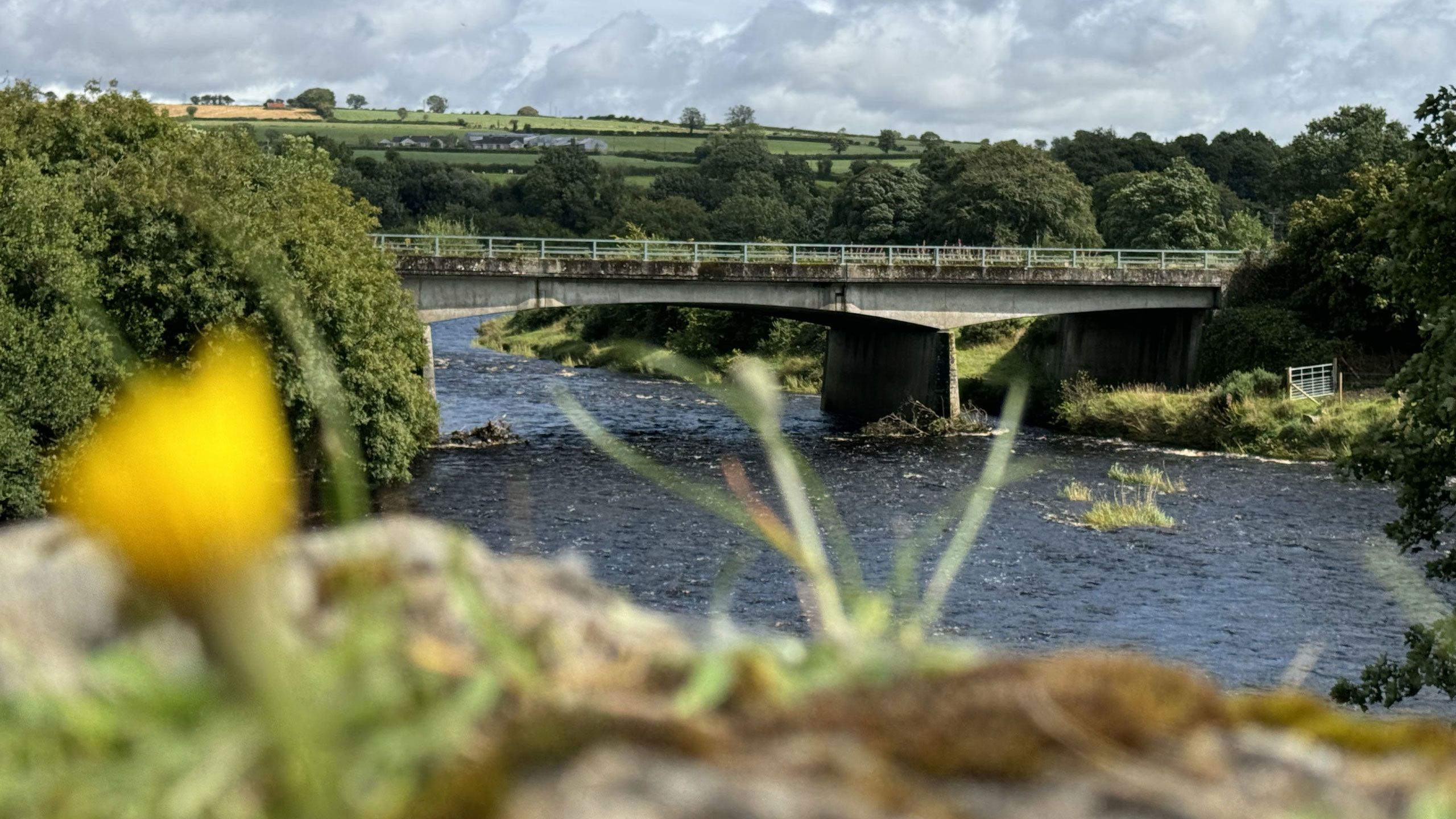
The money
The financial implications are often raised as a key criticism of a new A5 dual carriageway.
The project costs have significantly increased since its original estimate in 2007.
When the scheme was first announced, the estimated cost was about £800m.
The most recent estimate for the project is £1.6bn and the money already spent has surpassed £110m, even though construction hasn’t begun.

Green Party leader Eamon Ryan, former Taoiseach (Irish Prime Minister) Leo Varadkar and Tánaiste (Deputy Prime Minister) Micheál Martin speaking in February 2024.
Green Party leader Eamon Ryan, former Taoiseach (Irish Prime Minister) Leo Varadkar and Tánaiste (Deputy Prime Minister) Micheál Martin speaking in February 2024.
The Irish government said it will contribute €600m (£508m) for the upgrade of the A5.
But questions have been raised about where the rest of the money to fund the entire project will come from.
Responding to a recent assembly question on the issue, DfI Minister John O’Dowd said: “As with all major projects, particularly when there is a one-year budget, you can only confirm the budget for the following year.
“The Irish government's contribution has given us headroom, and I am engaging with the finance minister about a contribution from the Executive.”
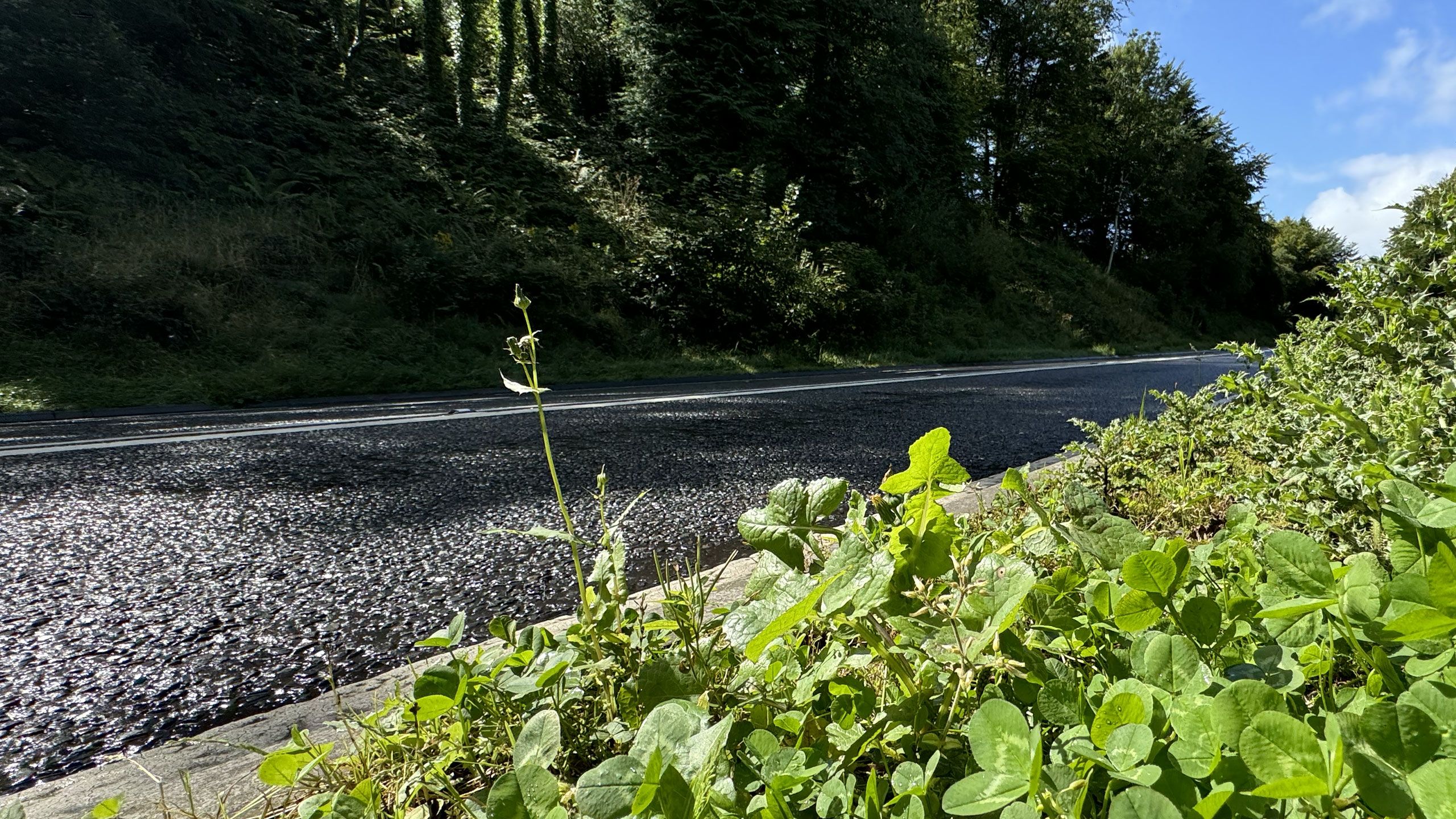
What's Next?

Those for and against the A5 do have one thing in common - a feeling of being left in limbo.
John O'Dowd said the delay in publishing the findings of 2023's public inquiry is due to a "detailed legal and professional review".

The public inquiry took place at the Strule Arts Centre in Omagh
The public inquiry took place at the Strule Arts Centre in Omagh
Ultimately his decision will determine if the upgrade goes ahead and what form it will take. It's expected within weeks.
But it could be subject to further legal battles.
For Angela O'Neill the "fear and dread" of life on the A5 continues.

“My son travels to Garvaghy for his football training and it’s literally opposite where my mum lost her life.
“Every time he goes out, you’re constantly in fear about whether he’ll come home.”
She added: “I believe when you travel that road you’re taking your life into your hands.”

Credits:
Author:
Niall McCracken
Additional Material:
Claire Brennan, Emma Canavan, Julian Fowler
Photography:
Judith Cummings, Peter Hamill, Jennifer Hunter, Niall McCracken
Archive Photographs:
Pacemaker Press, Press Association, Getty Images
Online Production:
Judith Cummings, Peter Hamill